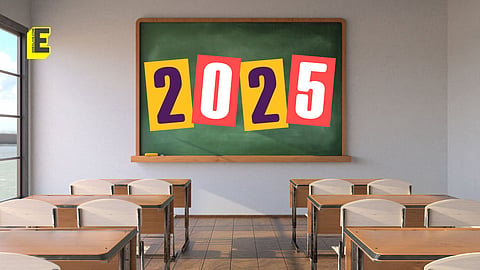

The year 2024 saw the education sector rocked by allegations of cheating, mismanagement and mass cancellations of key examinations.
If 2024 was the year of controversy for the education sector, then 2025 will be a year of reforms, reorganisation and restructuring.
The most serious controversy in India's education sector was the National Eligibility-cum-Entrance Test - Undergraduate (NEET-UG) paper leak, which led to noisy nationwide protests from students, parents, political parties, and coaching centres, stated a report by The New Indian Express.
The serious nature of the allegations led to a government backlash, following which a seven-member government-appointed panel led by Dr K Radhakrishnan, former head of the Indian Space Research Organisation (ISRO), was constituted.
The panel proposed a series of reforms aimed at tightening India's examination system and plugging loopholes and mismanagement.
In 2025, the National Testing Agency (NTA), an autonomous organisation that has been conducting entrance examinations for admissions and recruitment since 2017, will undergo a massive overhaul.
It will now only focus on conducting entrance examinations for admissions to higher education institutions. It will no longer oversee recruitment examinations.
For this, additional ten posts will be created to ensure "zero-error" testing.
One key proposal is the development of a DIGI-EXAM system on the lines of DIGI-YATRA-conducted in airports to ensure that only the candidate writing the exam joins the intended programme. The panel recommended multi-level biometric verification processes at various stages, moving to computer-adaptive tests and tech-driven entrance exams soon.
For all this, it suggested restructuring the NTA.
A three-member high-powered steering committee will also be set up to monitor the implementation of these recommendations. The committee will be headed by Prof Radhakrishnan.
"We have started the process of restructuring the NTA by creating new posts and appointing new officers. This will bring fresh energy into the organisation," Union Education Minister Dharmendra Pradhan had said when he announced the restructuring and reorganisation the NTA will be going through to usher in much-needed exam reforms.
As the government prioritises expanding and opening schools in the country, it has sanctioned Rs. 8,232 crore spread over eight years from 2025-26 for opening 85 Kendriya Vidyalayas (Kvs) and 28 Navodaya Vidyalayas (NVs)-the two most sought-after schools in India due to their quality education, according to the report by The New Indian Express.
The expansion will benefit over 85,000 students.The coming year may see the government reign in the mushrooming coaching centres in the country.
Pradhan has publicly spoken about the government's aim to reduce students' dependency on coaching centres and adopting a holistic approach to school education.
The new year will also bring cheers to parents as the National Council of Educational Research and Training (NCERT) textbooks for some classes will cost less. However, textbook prices will not be increased for any other class to ensure there is no financial burden on parents.
The NCERT, which prints five crore textbooks annually, will also work to increase its capacity to 15 crore in the coming year.
Not only that, the centre will start working on updating textbooks for Classes IX - XII according to the new National Curriculum Framework (NCF) so that they are launched by the 2026-27 academic session.
Also, getting the NCERT textbooks at your doorstep will become possible in 2025 as NCERT has tied up with both Flipkart and Amazon-at the same price, stated The New Indian Express report.
As 2025 will mark the fifth year of the National Education Policy (NEP) 2020, the focus will be on implementing it nationwide, transforming India as an educational hub for global citizens, and making Indian universities not only world-class but also internationalised by opening campuses in Africa and elsewhere.
